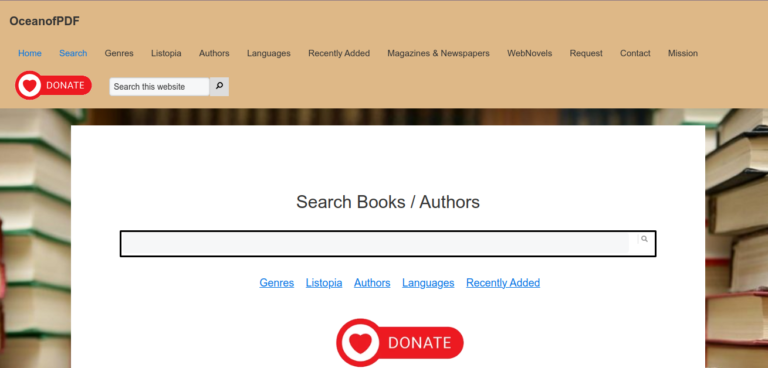- In today’s digital age, the demand for quick and easy access to books has risen dramatically. For book lovers and students, finding a convenient source to access a wide range of literature, textbooks, and novels is a high priority. One website that has gained notable attention in this space is Oceanofpdf. However, this platform has sparked debates around both convenience and legality, making it a controversial name in the world of online book sharing.
What is Oceanofpdf?
Oceanofpdf is an online platform that offers users the ability to download a variety of books in PDF format. The site is known for its vast collection of both fiction and non-fiction titles, providing free access to digital versions of many popular works. With its simple interface and extensive library, the website has attracted a large user base, especially those looking for free alternatives to costly books.
Why is Oceanofpdf Popular?
There are several reasons why Oceanofpdf has gained popularity:
- Free Access to Books: The most obvious reason for the platform’s rise in prominence is the free access it provides. Books, particularly academic ones, can be expensive, and Oceanofpdf offers a cost-free solution for readers on a budget.
- Wide Range of Titles: The website houses a massive selection of books, including best-selling novels, academic textbooks, self-help books, and more. This variety caters to a broad audience of readers.
- User-Friendly Interface: Oceanofpdf’s design is simple and intuitive, allowing users to search for and download books with ease.
- Quick and Easy Downloads: One of the major appeals of Oceanofpdf is how straightforward it is to download books. Readers can easily find their desired titles and get access to a downloadable PDF without going through extensive registration processes.
The Legal and Ethical Debate
While the convenience of Oceanofpdf is undeniable, its operation raises significant legal and ethical concerns. One of the primary issues revolves around copyright infringement. Most of the books available on Oceanofpdf are protected by copyright laws, and distributing or downloading these books without the appropriate permissions violates these laws.
Authors, publishers, and other content creators depend on the sales of their works for income. Platforms like Oceanofpdf, which provide free access to these works without compensation to the creators, undermine this model. As a result, many in the publishing industry argue that such websites contribute to financial losses for authors and publishers, especially independent authors who rely heavily on book sales.
Several legal actions have been taken against websites like Oceanofpdf in the past. Despite these measures, new versions of the site or similar platforms often pop up under different domain names, making it difficult to completely shut down these operations.
Alternatives to Oceanofpdf
For those looking for legal ways to access digital books, several alternatives to Oceanofpdf exist:
- Public Libraries: Many public libraries offer free access to a wide range of eBooks through platforms like OverDrive and Libby. With just a library card, users can borrow and read digital copies of books for free.
- Project Gutenberg: This website offers over 60,000 free eBooks, primarily focusing on classic works that are no longer under copyright. It’s a legal and ethical way to access a treasure trove of literature.
- Open Library: Operated by the Internet Archive, Open Library is another legal resource offering millions of free eBooks across various genres.
- Subscription Services: Platforms like Kindle Unlimited and Scribd provide readers with access to millions of books for a monthly subscription fee. While not free, these services offer a more sustainable way to access books.
Conclusion
Oceanofpdf represents both the possibilities and pitfalls of the digital age. While it provides users with easy access to a broad range of books, it also raises significant legal and ethical concerns surrounding copyright infringement. For readers, it’s important to weigh the convenience of such platforms against the potential harm they cause to authors and the publishing industry. Exploring legal alternatives ensures a more sustainable and fair ecosystem for everyone involved in the creation and distribution of literature.
